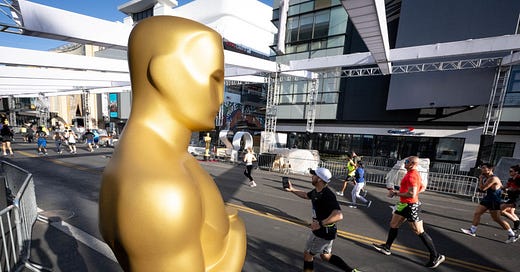Oscars' Decline and Fall: A History
A timeline of bad decisions, mishaps, mismanagement and good intentions run amok
by Richard Rushfield
Welcome to Oscar Hell Week!
There've been lots of years in the past called make-or-break for the world's grandest trophyfest, but this one feels pretty extra Makey or Breaky.
If Oscar can turn around last year's cataclysmic descent, maybe claw back a few points, then it can live to fight another day.
If it confirms last year's horrendous results as the new sea level, or even loses ground on that, then we can declare the era of Oscars as one of the world's great mass events effectively over, and Hollywood will officially have lost its greatest advertisement for itself.
So how did The Academy get here? It hasn't in fact been a long slow decline. Despite all its foibles, Oscar's audience largely hung around, until just a few years ago — when it fell off a cliff.
I wanted to review the trail of tears that led us to this sad crossroads. Going through the history, you can see that like Hemingway's description of how you go bankrupt, The Academy lost its audience “two ways: Gradually, then suddenly.”
When a nation stops believing in its own story, its just waiting for a strong breeze to blow it over. Some of Oscar's mistakes were well-intentioned, just poorly handled. Many were just confused. But underlying it all you can see a movement that has just stopped believing in itself; or worse, doesn't understand what it existed for. And in the absence of any story to tell itself, it all becomes kindling.
It's not every community that systematically dismantles its own advertisement, but Hollywood can take a bow on that one. Here's a brief timeline of bad decisions, snafus and missteps that led us here.
Let's start back at the dawn of this millennium.
The change from the old grandiose system, turning to an era Bret Easton Ellis would label Post-Empire, was just beginning to emerge and in the meantime, Oscar stood proud atop it all. Never stronger, never dreaming what calamities await it.
2004
Winner: Lord of The Rings: Return of the King • Billy Crystal hosts for the 8th time. • Oprah spends a month of her show behind the scenes at the Oscars. • A federal judge overturns a rule banning screeners. • The average gross of an Oscar nominee is $127 million, a list which includes Master and Commander, Mystic River, and Lost in Translation. • Critic Ken Tucker says of the show, “It managed to do what Hollywood may not have: convince us that this was a great year for the movies.” • Audience: 43.5 million, up 26 percent from the previous year.
2005
Winner: Million Dollar Baby • In an attempt to attract a younger audience, Chris Rock is chosen to host. • A month before the show, Rock tells EW in an interview, “Come on, it's a fashion show. No one performs; it's not like a music show. What straight black man sits there and watches the Oscars? Show me one.” Leading to calls by AMPAS members to remove him from the job. • In the first big attempt to shorten the ceremony (of many, many to come) in certain categories the winners are called up to stand together on stage as their names are read, while other awards are presented from the floor. • Chris Rock's jibes about Jude Law's ubiquitous career, draws a harsh rebuke on stage from Sean Penn • For the first time in 18 years, none of the nominees are among the top 10 highest-grossing films of that year. • Audience: 42.1 million.





